Changing Japan offers business potential
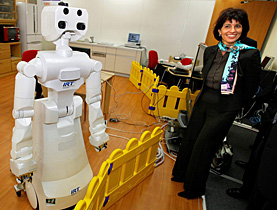
Swiss companies face a golden opportunity to tap into Japan's transforming consumer market, Economics Minister Doris Leuthard said during a visit to the country.
Leuthard told swissinfo.ch this week that the environmental, health and pharmaceuticals sectors show the greatest potential for growth when Japan’s ailing economy gets back on track.
She also shared her first impressions about the new government that re-painted the Japanese political landscape when it came into power on August 30.
Leuthard was in Japan to promote the free trade accord (FTA) between the two countries that came into force on September 1. She also met for the first time with ministers of the new Japanese government.
swissinfo.ch: What were the main successes of this trip?
Doris Leuthard: Our Swiss Symposium [held in Tokyo on Tuesday] attracted a lot of high ranking people from business, science and culture from both Japan and Switzerland. We wanted people to get in touch, find investors and promote the free trade agreement. We had 700 to 800 visitors, so this was a great success.
swissinfo.ch: What are the growth areas for Swiss exporters to Japan?
D.L.: Japan will be among the countries that will recover [from the global recession] quite rapidly. Therefore, we think it will be quite interesting to be present here, especially in the environmental sector.
For example, houses are built in Japan with a life cycle of just 30 years so there is a lot of potential for our construction industry. There is also potential [for firms specialising in] heating systems, solar energy and water supply.
We are also promoting Swiss design. Japanese goods are functional, but consumers also like brands and innovative design. We have some famous architects, engineers and designers who would like to enter this market.
swissinfo.ch: Is there also a profitable market among rapidly ageing Japanese consumers (expected to make up 40 per cent of the population by 2055)?
D.L.: Nestlé [the world’s largest food manufacturer] have re-focused many of their products because they are aware of the needs of the over-65s. The Japanese are very health conscious and our pharmaceutical, food and nutrition industries are well placed here.
swissinfo.ch: What are you doing to attract Japanese investment to Switzerland?
D.L.: Switzerland currently invests 16 times more in Japan than vice versa. Therefore we tried to inform potential Japanese investors about our shared values of high quality, research and development, a skilled labour force, life quality, stability and safety.
We are trying to attract electronic, pharmaceutical and IT companies heading to European markets because we have a lot of expertise in these areas in Switzerland.
swissinfo.ch: What are your early impressions of the new Japanese government?
D.L.: It was too early to discuss detailed content of their new positions, but I was surprised with the openness of the new ministers. It was not as formal as before – I could hold talks without so much protocol. This new behaviour was a positive surprise [that demonstrated] how we can talk together.
The new economics minister, [Masayuki Noashima], told me that the government will be more open to other FTAs. Opening up markets to others sends a good signal during such a difficult crisis, that a lot of other countries have used to introduce more protectionist measures.
Matthew Allen in Osaka, swissinfo.ch
Swiss Economics Minister Doris Leuthard led a business delegation to Japan from October 5-8 with the purpose of promoting the recently implemented free trade agreement between the two countries.
The Swiss delegation comprised 23 business leaders, including representatives of the Swiss Bankers Association, the Swiss Business Federation (economiesuisse), Nestlé, Schindler, Georg Fischer, Panalpina and Novartis.
Leuthard met officials of the new Japanese government, including Agriculture, Food and Fisheries Minister Hirotaka Akamatsu and Economics, Trade and Industry Minister Masayuki Naoshima and Vice-Minister of Finance Yoshihiko Noda.
She also hosted a Swiss Symposium of Swiss and Japanese business leaders in Tokyo, that showcased Swiss design expertise.
Leuthard test-drove new electric cars from Mitsubishi and visited the robotic centre at Tokyo University.
The Free Trade and Economic Partnership Agreement (FETPA) – so-called because it extends beyond the normal parameters of FTAs to include areas such as e-commerce – was signed in February 2009.
The accord, which came into force on September1, aimed to abolish a range of tariffs on mainly industrial goods and some selected agricultural products.
It includes provisions to free up the service-sector market, including financial services, and make it easier for nationals to work in each other’s countries (but not to the same extent as under the free movement of people accord with the European Union).

In compliance with the JTI standards
More: SWI swissinfo.ch certified by the Journalism Trust Initiative

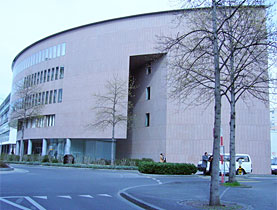
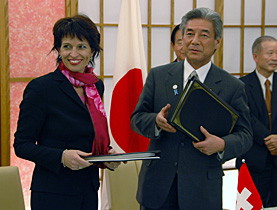
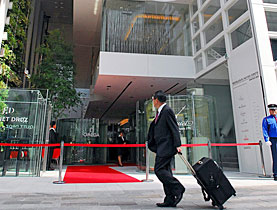
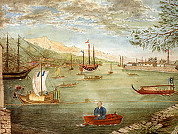
You can find an overview of ongoing debates with our journalists here. Please join us!
If you want to start a conversation about a topic raised in this article or want to report factual errors, email us at english@swissinfo.ch.